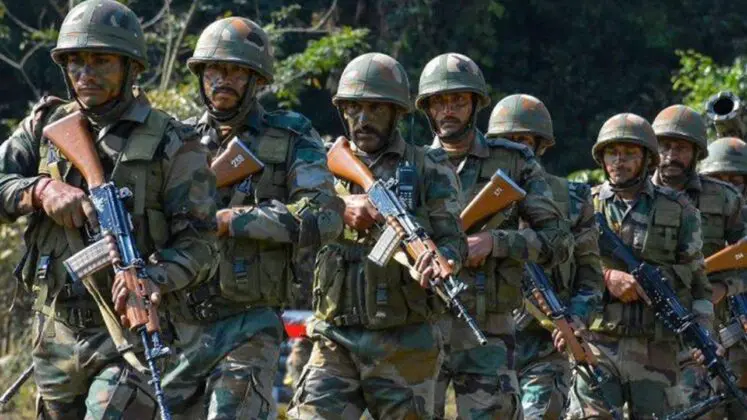
So, you’re dreaming of joining Paramilitary Force, but there’s one concern holding you back—your eyesight.
Do you have a bad or weak eyesight? Or maybe, you wear glasses. Perhaps you’ve been thinking, “Is my vision good enough to meet the eyesight requirements for these forces?” or “What are the exact standards I need to meet to qualify?”
You might also be asking yourself, “Can I join Para SF if I wear glasses?” or “How can I improve my eyesight for the Para Military?” You might even be wondering, “Is LASIK eye surgery allowed in the recruitment process?”
Well, in this blog, we’ll walk you through everything you need to know about the minimum eyesight standards for paramilitary recruitment. So, let’s dive and explore!
Contents
Here’s an overview of the general vision standards needed to join the paramilitary forces, including the Paramilitary Special Forces (Para SF):
Distant Vision
Better Eye: The vision in the better eye must be 6/6 (20/20) without the use of glasses or contact lenses.
Worse Eye: The vision in the weaker eye must be 6/9 (20/30), which is slightly weaker but still within acceptable limits.
This is the standard vision requirement for most paramilitary forces. Both eyes must be free from significant refractive errors to qualify.
Color Vision
Color Blindness: Candidates must pass a color perception test and must not have color blindness. Being able to distinguish red and green is essential in operational situations, so color blindness disqualifies candidates from joining paramilitary forces.
For Para SF or other elite forces, good color vision is critical, as it’s essential for recognizing signals and distinguishing between different objects and threats.
Refractive Errors
Myopia (Nearsightedness): A maximum of -4.00 diopters is allowed.
Hypermetropia (Farsightedness): A maximum of +4.00 diopters is allowed.
Astigmatism: A maximum of ±2.00 diopters is permitted.
Candidates with higher refractive errors than these limits will not be eligible unless corrective measures like LASIK surgery are performed to bring the vision within the required range.
Specific Eye Health Requirements
For forces like Army, the eye length must be less than 26mm for optimal vision health.
For Navy and Airforce, the eye length should not exceed 25.5mm.
Each paramilitary force has its own set of specific vision requirements to ensure candidates are fit for their unique roles. Here’s a breakdown of the eyesight standards for some of the major paramilitary forces:
Yes, you can join the paramilitary forces if you wear glasses, as long as your vision meets the required standards. The key requirement is that your eyesight must be correctable to the specified levels (6/6 in the better eye and 6/9 in the worse eye) without glasses or contact lenses. If your vision can be corrected to these standards using glasses, you are likely eligible to apply.
However, glasses alone may not be enough for some paramilitary forces. Many recruitment processes require that your vision is unaided, meaning without any corrective lenses or glasses. So, if your eyesight doesn’t naturally meet the standards, wearing glasses during the recruitment process may not be sufficient.
LASIK Surgery: LASIK is one of the most popular options to correct refractive errors (myopia, hypermetropia, and astigmatism). Many paramilitary forces accept LASIK surgery as long as your vision meets the required standards post-surgery.
After LASIK, most candidates experience immediate improvements in their vision, and in just a few days, their eyes stabilize.
Many forces, including CAPF, BSF, CRPF, and others, allow LASIK candidates, provided the vision is fully stable post-surgery (usually after a waiting period of 6 months).
Flapless LASIK: If you’re worried about medical examinations, opting for flapless LASIK procedures like CustomEyes or TransPRK might be a better option. These surgeries are less detectable in medical tests compared to traditional LASIK, making them ideal for paramilitary candidates.
Improving your eyesight is possible, and there are several steps you can take to maintain healthy vision. Whether you’re preparing to join the paramilitary forces or simply want to take better care of your eyes, here are some helpful tips:
Get Regular Eye Checkups
It’s important to see an eye doctor at least once a year, especially if you have a history of vision issues or family members with eye conditions.
Eat a Vision-Healthy Diet
Include foods rich in Vitamin A, C, E, and omega-3 fatty acids. Carrots, leafy greens, citrus fruits, and fish like salmon are excellent for maintaining eye health. Foods rich in lutein and zeaxanthin (found in spinach, kale, and eggs) can also help protect your eyes from age-related damage.
Practice the 20-20-20 Rule
If you spend a lot of time looking at screens, follow the 20-20-20 rule: every 20 minutes, take a 20-second break, and look at something 20 feet away. This gives your eyes a chance to relax and reduces strain from long periods of screen time.
Exercise Your Eyes
Just like the rest of your body, your eyes need exercise too. Try simple eye exercises like focusing on a nearby object, and then focusing on something far away. You can also roll your eyes or blink rapidly to help reduce fatigue.
Stay Hydrated
Dehydration can affect your eyes, making them dry and irritated. Drink plenty of water throughout the day to keep your eyes well-lubricated.
Wear Sunglasses
Protect your eyes from harmful UV rays by wearing sunglasses that block 100% of UV rays. This helps prevent long-term damage to your eyes, such as cataracts or macular degeneration.
These steps can help you improve and maintain your eyesight for better overall vision health. If you’re considering LASIK or any corrective surgery, make sure to consult an eye specialist to determine the best option for your needs.
If you’re struggling with poor eyesight and want to meet the vision standards for the paramilitary forces, LASIK surgery could be your solution. Experience the freedom of clear vision and say goodbye to glasses or contacts! At EyeMantra, LASIK surgery starts at just ₹12,000 per eye.
Book your free appointment now at +91 9711116605 and take the first step towards clearer, sharper vision!